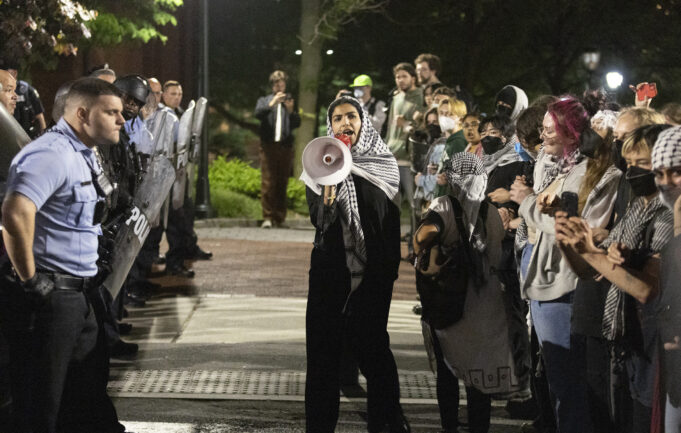According to new research, hate crimes against Muslims and Palestinians are up nearly 70 percent since October 7, compared to this time last year. The increase in hate crimes includes stabbings, shootings, attempted drownings and more. Everyone considered Muslim or Palestinian seems to be fair game.
Last October, six-year-old Wasea Al Fayoume was stabbed to death in Illinois by a man who police say targeted the boy and his mother because they were Palestinian Americans.
In November, three college students of Palestinian descent were shot in Vermont, and this year, a Texas Palestinian American man was stabbed in February and in May, a Texas three-year-old Palestinian American girl nearly drowned after being attacked by a woman.
Add to those incidents the numerous Muslim and Palestinian college students attacked and verbally abused on campuses around the country protesting what the United Nations recently declared as Israel’s “Targeted Starvation Campaign” that has led to famine and genocide in Gaza.
The Council on American-Islamic Relations (CAIR), the nation’s largest Muslim civil rights and advocacy organization, documented from January to June 2024, 4,951 incoming complaints, a 69 percent increase over the same period in 2023. Education discrimination incidents spiked in May as student encampments urging universities to take anti-genocide stands dominated media headlines.
The experience of students and employees during this cycle of anti-Muslim, anti-Palestinian hate remains the standout trend compared to past cycles.
“Too many places of higher education, which have historically permitted Islamophobic speakers to poison their campus in the name of academic freedom, apparently find anti-genocide speech intolerable. Since last fall university administrators have been a primary perpetrator of anti-Muslim racism,” said CAIR Research and Advocacy Director Corey Saylor.
He added, “Our data shows that as student protests dominated media coverage of the movement opposing the Gaza genocide, employers also continued punishing their employees for their viewpoints. We are also seeing Federal Agencies like Customs and Border Protection and the FBI interpreting being Muslim or anti-genocide as suspicious activity.”
A student who wanted to remain anonymous stated that he attends a D.C. area university. He and his friends immediately joined the protest movements on their campuses. They knew they could possibly be arrested but being suspended from school never crossed their minds.
Thousands of arrests took place last spring on U.S. college campuses for participating in pro-Palestinian protests. Many of those arrested were students.
“I was kind of looking forward to getting arrested. My parents were arrested for protesting the Vietnam War. I took the arrest as a badge of honor that I was continuing the tradition of protest in my family but next came the possibility of getting suspended. That really shook me,” the student told The Final Call.
“Alhumdulillah (Praise be to God) the charges were dropped and we were not suspended but I have friends around the country who were also concerned about getting suspended. They were also concerned about losing scholarships, and job offers. I thought we had freedom of speech. What about that?”
Cornell international graduate student Momodou Taal was temporarily suspended for participating in a pro-Palestinian encampment. He told NPR, “The school has deemed that my activity or my participation on campus is a threat somehow.”
In a written response to NPR, Cornell says it gave students the option to finish the semester with incomplete grades and remain enrolled as long as they do not violate the university’s policies again.
Mr. Taal explained to NPR that he was considering his options. He said he was guided by his conscience and that participating in the protests was the right thing to do, even though there could be long-term consequences.
The backlash to protests against Israel includes students being doxed. Doxing is “the malicious act of publicly revealing someone’s private or personally identifiable information online without their consent.” The revelation of student protesters’ identities led to many being blackballed.
The night after the Hamas attack, a coalition of more than 30 Harvard student groups posted online an open letter saying that Israel was “entirely responsible” for the violence. Within days, student members of those groups were doxxed, and their personal information was posted online.
The New York Times reported siblings back home were threatened. Wall Street executives demanded a list of student names to ban their hiring. To add insult to injury, Accuracy in Media’s digital billboard truck, also used at other campuses, circled Harvard Square, flashing student photos and names, under the headline, “Harvard’s Leading Antisemites.”
“It’s ironic that students on the campus where Facebook was invented are shocked that their names are publicly available,” Adam Guillette, president of Accuracy in Media, told the media. “We’re merely amplifying their message.”
According to CAIR, Islamophobia in the U.S. comes in cycles, with the last two large waves generated by former President Donald Trump’s 2015 announcement and 2017 implementation of his Muslim ban. This current wave exceeds the combined total incidents received during those two cycles.
—Nisa Islam Muhammad, Staff Writer













